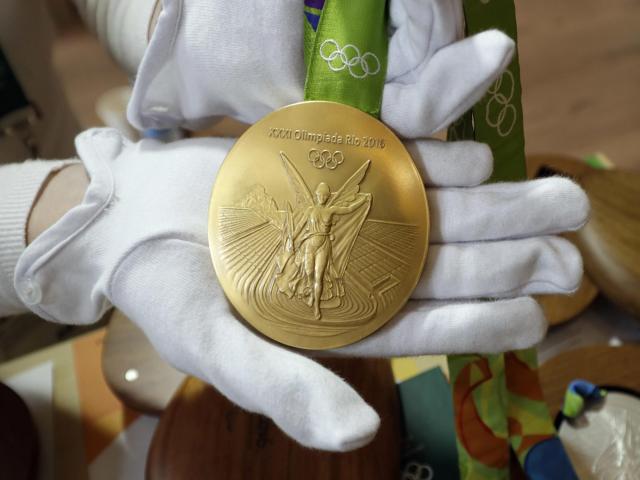A gold miner weighs his weekly production at an illegal mine in the Amazon jungle

To match the festive spirit of South America’s first Olympics, officials from Brazil, the host country for the 2016 games in Rio de Janeiro, boasted that the medals hung around the necks of athletes on the winners’ podium were also a victory for the environment: The gold was produced free of mercury and the silver recycled from thrown away X-ray plates and mirrors.
Five years on, the refiner that provided the gold for the medals, Marsam, is processing gold ultimately purchased by hundreds of well-known publicly traded U.S. companies — among them Microsoft, Tesla and Amazon — that are legally required to responsibly source metals in an industry long plagued by environmental and labor concerns.
But a comprehensive review of public records by The Associated Press found that the Sao Paulo-based company processes gold for, and shared ownership links to, an intermediary accused by Brazilian prosecutors of buying gold mined illegally on Indigenous lands and other areas deep in the Amazon rainforest.
The AP previously reported in this series that the scale of prospecting for gold on Indigenous lands has exploded in recent years and involves carving illegal landing strips in the forest for unauthorized airplanes to ferry in heavy equipment, fuel and backhoes to tear at the earth in search of the precious metal. Weak government oversight enabled by President Jair Bolsonaro, the son of a prospector himself, has only exacerbated the problem of illegal gold mining in protected areas. Critics also fault an international certification program used by manufacturers to show they aren’t using minerals that come from conflict zones, saying it is an exercise in greenwashing.
“There is no real traceability as long as the industry relies on self-regulation,” said Mark Pieth, a professor of criminal law at the University of Basel in Switzerland and author of the 2018 book “Gold Laundering.”
“People know where the gold comes from, but they don’t bother to go very far back into the supply chain because they know they will come into contact with all kinds of criminal activity.”
___
Much like brown and black tributaries that feed the Amazon River, gold illegally mined in the rainforest mixes into the supply chain and melds with clean gold to become almost indistinguishable.
Nuggets are spirited out of the jungle in prospectors’ dusty pockets to the nearest city where they are sold to financial brokers. All that’s required to transform the raw ore into a tradable asset regulated by the central bank is a handwritten document attesting to the specific point in the rainforest where the gold was extracted. The fewer questions asked, the better.
At many of those brokers’ Amazon outposts — the financial system’s front door — the gold becomes the property of Dirceu Frederico Sobrinho.
For four decades, Dirceu has embodied the up-by-your-bootstraps myth of the Brazilian garimpeiro, or prospector. The son of a vegetable grocer who sold his produce near an infamous open-pit mine so packed with prospectors — among them Bolsonaro’s father — they looked like swarming ants, he caught the gold bug in the mid-1980s and began dispatching planeloads of raw ore from a remote Amazon town. He secured his first concession in 1990, one year after the nation rolled out a permitting regime to regulate prospecting.
Today, from a high rise on Sao Paulo’s busiest avenue, he is a major player in Brazil’s gold rush, with 173 prospecting areas either registered to his name or with pending requests, according to Brazil’s mining regulator’s registry. In the same building is the headquarters of the nation’s gold association, Anoro, which he leads. Dirceu, until last year, was also a partner in Marsam.
But even with gold jewelry dangling from his fingers and wrist, Dirceu still proudly boasts his everyman garimpeiro roots.
“You don’t motivate someone to go into the forest if they’re not chasing after a dream,” he said in a rare interview from his corner office studded with a giant jade eagle. “Whoever deals in gold has that: They dream, they believe, they like it.”
“We have a saying among the garimpeiros: ‘I’m a pawn, but I’m a pawn for gold,’” he adds.
At the center of Dirceu’s empire is F.D’Gold, Brazil’s largest buyer of gold from prospecting sites, with purchases last year totaling more than 2 billion reais ($361 million) from 252 wildcat sites, according to data from the mining regulator. Only two international firms that run industrial-sized gold mines paid more in royalties in 2021, a sign of how once artisanal prospecting has become big business in Brazil — at least for some.
In August, federal prosecutors filed a civil suit against F.D’Gold and two other brokers seeking the immediate suspension of all activities and payment of 10 billion reais ($1.8 billion) in social and environmental damages.
The complaint alleges the companies failed to take actions that would have prevented the illegal extraction of a combined 4.3 metric tons from protected areas and Indigenous territories, where mining is not allowed. Dirceu said his company complies with all laws and has implemented extra controls, but he acknowledged that determining the exact origin of the gold it obtains is “impossible” at present. He has proposed an industry-wide digital registry to improve transparency.
The ongoing suit is the result of a study published inuly by the Federal University of Minas Gerais which found that as much as 28% of Brazil’s gold produced in 2019 and 2020 was potentially mined illegally. To reach that conclusion, researchers combed through 17,400 government-registered transactions by F.D’Gold and other buyers to pinpoint the location where the gold was purportedly mined. In many cases, the given location wasn’t an authorized site or, when cross-checked with satellite images, showed none of the hallmark signs of mining activity — deforestation, stagnant ponds of waste — meaning the gold originated elsewhere.
Dirceu’s name and those of F.D’Gold and his mining company Ouro Roxo have popped up repeatedly over the years in numerous criminal investigations. He has been charged but never convicted.
A decade ago, federal prosecutors in Amazon’s Amapa state accused his company of knowingly purchasing illegal gold from a national park that was later transformed into gold bars. The charges were dismissed in 2017 after a federal judge in Brasilia ruled that F.D’Gold made the purchases legally, as evidenced by the invoices. Separate money laundering charges against Dirceu were also dismissed, due to lack of evidence. Dirceu has denied wrongdoing.

UK’s Johnson apologizes for attending lockdown party
- Prime Minister Boris Johnson apologized Wednesday for attending a garden party during Britain’s coronavirus lockdown in 2020, but brushed aside

Russia invaded Ukraine a week ago. What comes next?
- Russia invaded Ukraine a week ago. What comes next?Russia invaded Ukraine a week ago. What comes next?

Pedro Castillo LIVE: Minister Aníbal Torres puts Alberto Fujimori in a humanitarian pardon debate
- Follow the latest news from the President of Peru, Pedro Castillo. Find out here about Walter Ayala, Aníbal Torres, Mirtha Vásquez, Dina Boluarte

Choose Wisely From a Variety of Cleaning Services
- The current situation makes it impossible to relax or spend time with oneself or even with ones loved ones. Everyone has